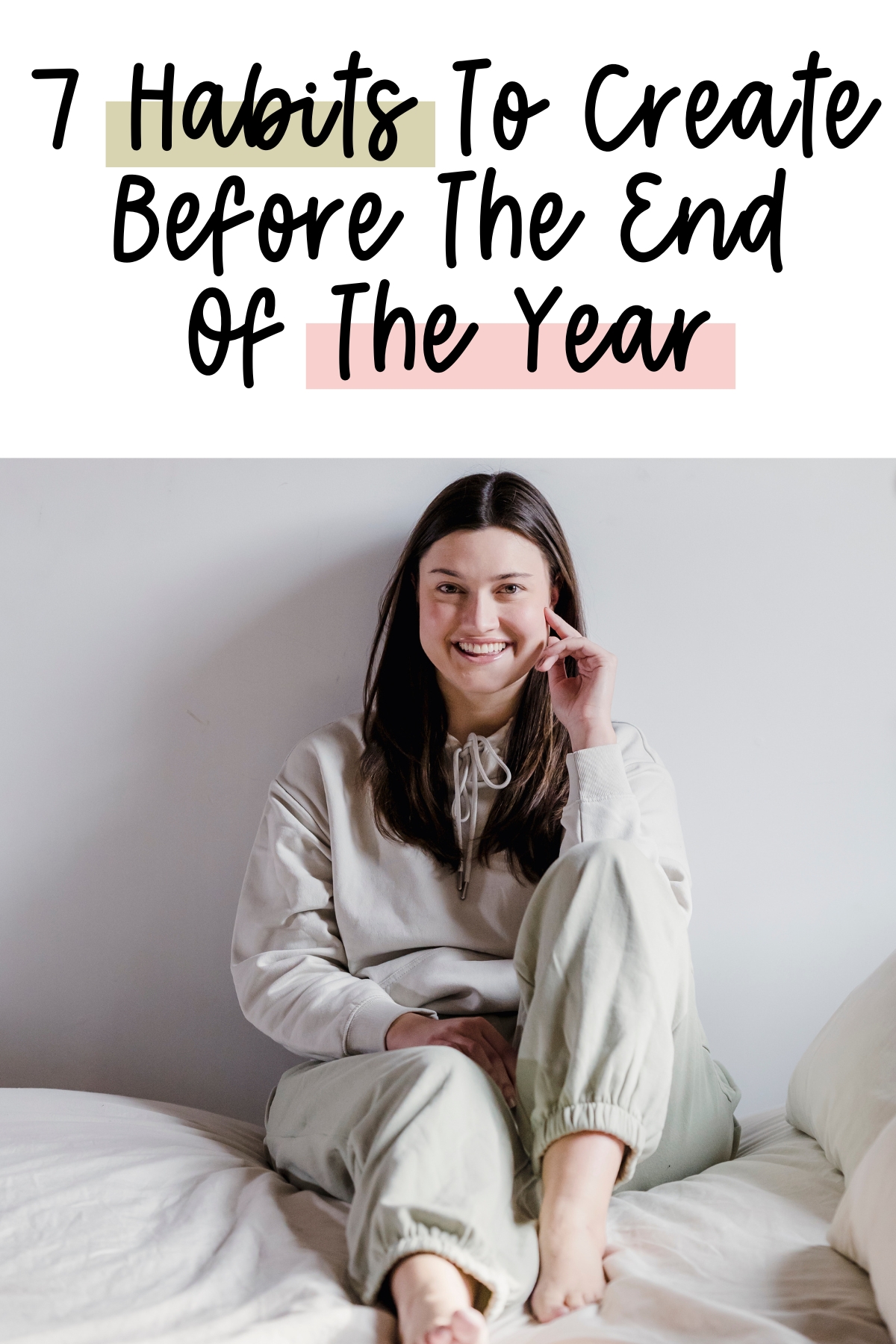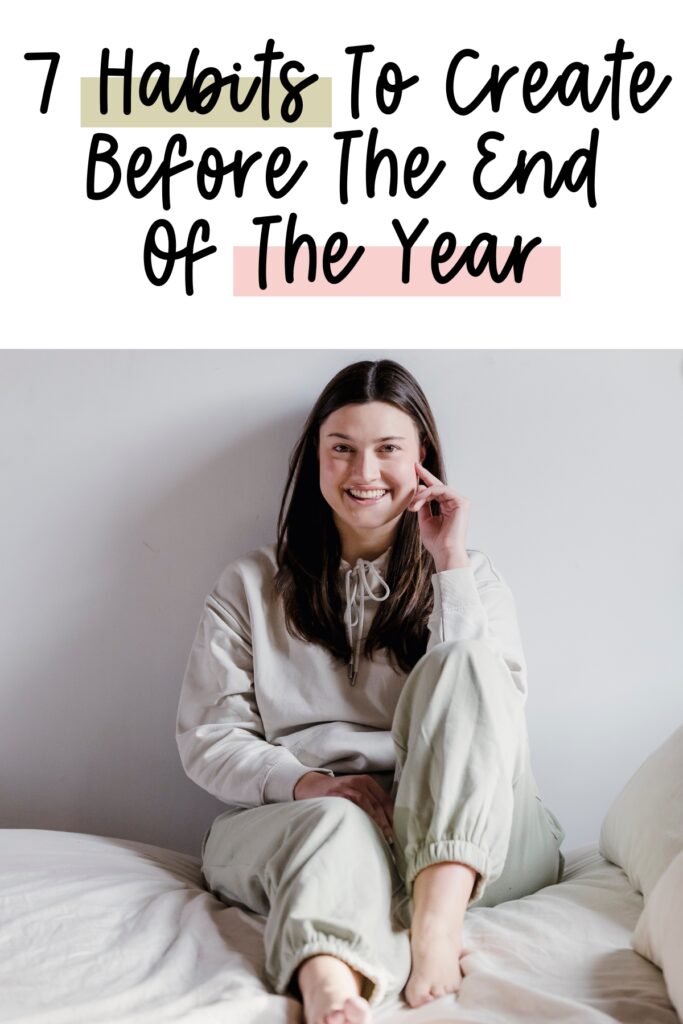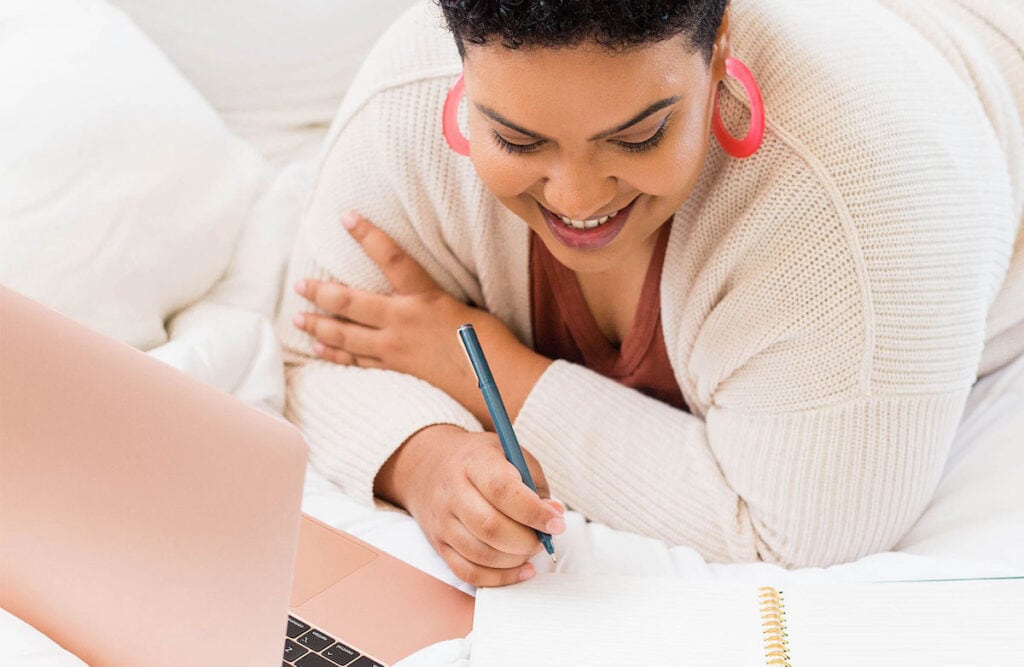7 Habits To Create Before The End Of The Year
As the year draws to a close, it’s a natural time for reflection and planning. While New Year’s resolutions are popular, hanging out until the start of a new year to kick off your new habits isn’t always the best option.
It’s kind of like the saying “The best time to plant a tree was 20 years ago… the second best time is now.” Right now is the best time to start new habits, do the thing you’ve been putting off, turn the ‘one day’ into ‘today’.
That’s why, before this year ends, it’s ideal to begin incorporating daily habits that can significantly enhance our wellbeing and productivity.
That’s where these habits to create before the end of the year come in.
Establishing good daily habits is not just about making momentary changes; it’s about transforming our lives for the better. Whether it’s adopting a healthier lifestyle, becoming more organized, or dedicating time to personal growth, these habits can be the stepping stones to a more fulfilled and balanced life.
Maybe last year’s resolution was to start a new habit, or perhaps you want to kick off the New Year feeling good and energized and on track, or maybe you just want to do something now that your future self will thank you for… whatever it is, these new habits will help.
The habits below are designed to enrich various aspects of your life, from mental and physical health to personal and professional development. By starting these habits now, you’re not just ending the year on a high note; you’re setting the stage for a more productive and positive new year.
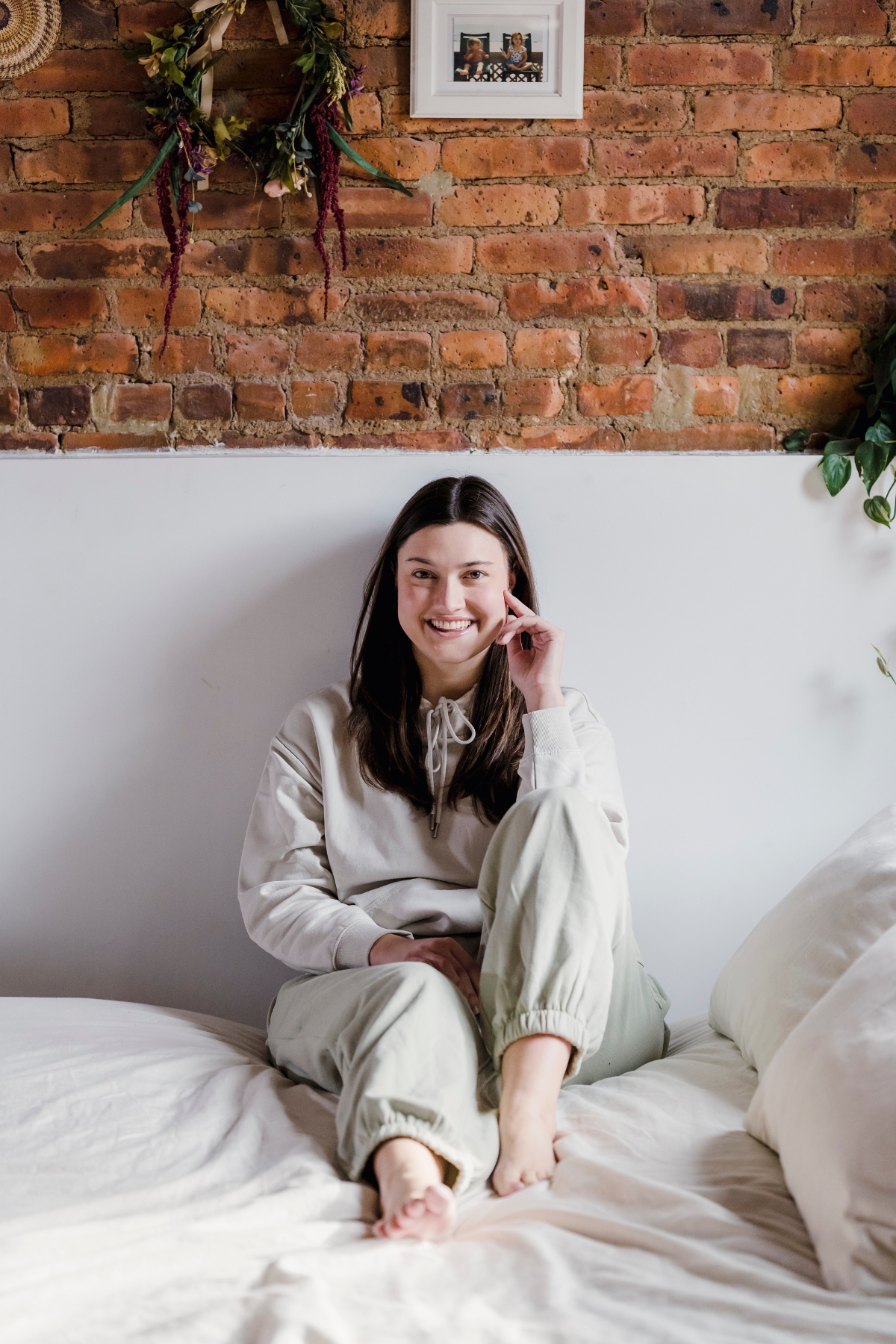
Habit 1: Mindful Mornings
Starting your day with intention and mindfulness can have a profound impact on the rest of your day. Mindful mornings are about creating a space of calmness and clarity before jumping into the day’s tasks.
How to Incorporate a Mindful Morning Routine:
Meditation: Begin with just five minutes of meditation. Find a quiet spot, close your eyes, and focus on your breathing. This practice helps in reducing stress and improving concentration.
Gratitude Journaling: Spend a few minutes each morning writing down things you are grateful for. This simple act can shift your mindset to one of positivity and thankfulness.
Gentle Stretching or Yoga: Physical movement, even gentle stretching or a few yoga poses, can awaken your body and mind, preparing you for the day ahead.
Mindful Breakfast: Rather than rushing through your first meal, take the time to enjoy your breakfast mindfully. Savor the flavors and textures, and appreciate this moment of nourishment.
Remember, the key is consistency. Even on busy mornings, try to dedicate a few minutes to these practices. Over time, you’ll notice a more peaceful start to your day and an increase in overall mindfulness.
Habit 2: Daily Physical Activity
Regular physical activity is crucial for both physical and mental health. It boosts energy, improves mood, and can be a fun part of your daily routine.
Easy Ways to Incorporate Daily Physical Activity:
Take Short Walks: Whether it’s a morning walk, a lunchtime stroll, or an evening saunter, walking is a simple way to get your body moving and enjoy some fresh air.
Desk Exercises: If you work at a desk, incorporate short exercise breaks. This could be stretching, doing some chair squats, or even a few minutes of jumping jacks.
Home Workouts: With numerous online resources available, you can easily find a 10-15 minute workout routine that suits your level and interest, be it yoga, HIIT, or dance.
Active Commuting: If possible, opt for cycling or walking to work. If you commute by public transport, consider getting off a few stops early and walking the rest of the way.
The idea is to find activities that you enjoy so that exercise doesn’t feel like a chore. By making physical activity a regular part of your day, you’ll not only improve your fitness but also relieve stress and enhance your mood.
Habit 3: Healthy Eating Choices
The food we consume plays a vital role in how we feel and function throughout the day. We all know that making conscious, healthy eating choices can lead to improved energy, better mood regulation, and overall better health.
But… at this time of year it’s easy to get caught up in the rush of the holiday season and don’t even get me started on the amazing food that is filling up my Pinterest feed…
You don’t have to be 100% strict at healthy eating, you could simply start with making one healthier choice each day. That’s what I did to reduce the overwhelm and the guilt of not sticking to a hardcore healthy eating plan.
Plus, much to my dismay, I have learnt that consistency trumps just about everything else. Making one healthier choice each day is so much better than eating healthy for one day a week (or a month…).
Strategies for Incorporating Healthier Eating Habits:
Plan Your Meals: Take some time each week to plan your meals. This helps in making healthier choices and avoids the temptation of last-minute, less nutritious options. You can use meal planners to help with this too.
Incorporate More Whole Foods: Focus on adding more fruits, vegetables, whole grains, and lean proteins to your diet. These foods are packed with essential nutrients that benefit your body and mind.
Mindful Eating: Pay attention to your hunger cues and eat mindfully. Enjoy your food without distractions like TV or smartphones, and learn to savor each bite. You’ll be amazed at how much you eat without really thinking about it.
Stay Hydrated: Often, our brain gets signals mixed up and we mistake thirst for hunger. Ensure you’re drinking enough water throughout the day, which aids in digestion and keeps you feeling full.
By gradually implementing these changes, you’ll notice a difference in your energy levels and overall health. Remember, the goal is not to ‘diet’ but to create a sustainable, healthy eating pattern.

Habit 4: Time Management and Planning
Effective time management is key to productivity and reducing stress. By planning your day and managing your time wisely, you can achieve more and feel less overwhelmed.
Tips for Better Time Management and Planning:
Use a Planner or Digital Tool: Whether it’s a physical planner or a digital app, find a tool that helps you organize your tasks and appointments.
I personally love printed planners – being able to write things down makes a massive difference and makes me feel more in control. Plus I can personalize them, decorate them, and make them more enticing for me to use.
Prioritize Tasks: Each morning, determine the most important tasks for the day. Focus on completing these before moving on to less critical activities.
Set Time Limits for Tasks: Allocate specific time blocks for each task. This helps in maintaining focus and efficiency, and prevents tasks from taking longer than necessary.
Avoid Multitasking: While it might seem efficient, multitasking often leads to decreased productivity. Focus on one task at a time for better results, and take a moment note when you actually complete a task – I often leave tasks 80% done, so following through to completion is something I’m working on (just don’t include my 20+ crochet projects I’ve not yet finished).
Take Regular Breaks: Short breaks throughout the day can improve overall productivity and creativity. Use this time to stretch, walk, or simply rest your mind.
We don’t take enough time to just sit quietly anymore, and our minds are paying the price for it. Just sit quietly, without your phone, without TV, without music, without a podcast… and just let your mind wander.
Implementing these time management strategies can lead to a more organized and less stressful day. It allows you to make the most out of your time, leaving room for relaxation and leisure.
Habit 5: Learning or Personal Development
Dedicating time each day to learning or personal development can lead to significant improvements in your skills, knowledge, and overall life satisfaction. It’s about investing in yourself to grow both personally and professionally.
I’m an obsessive learner – possibly to the point where it’s a problem, but that’s not the worst problem to have.
I’ll often have a podcast or audiobook playing throughout the day, when I go grocery shopping I wear headphones so I can listen to audiobooks, my YouTube history is filled with videos that teach me how to do things (and the occasional Ninja KidsTV video, thanks to my kids).
We have never had as much and as readily access to information as we do now – what are you learning?
Ways to Incorporate Learning into Your Daily Routine:
Read Daily: Allocate a small amount of time each day for reading. Whether it’s a book, an article, or a research paper, reading expands your knowledge and exposes you to new ideas (reading this article counts!!!)
Online Courses and Podcasts: Utilize online platforms for short courses or listen to educational podcasts. These can be great sources of information and can be easily integrated into your daily routine, like during a commute.
My current favorites include Dr Andrew Huberman from Huberman Labs, and Dr K from Healthy Gamer GG.
Practice a New Skill: Dedicate time to practicing a new skill, be it a language, a musical instrument, or a technical skill. Regular practice, even in small doses, leads to improvement.
I love woodworking and making things is such a great way to exercise your mind. Woodworking for Mere Mortals is my fave YouTube channel – I’ve learnt so much from this (and from just trying things out).
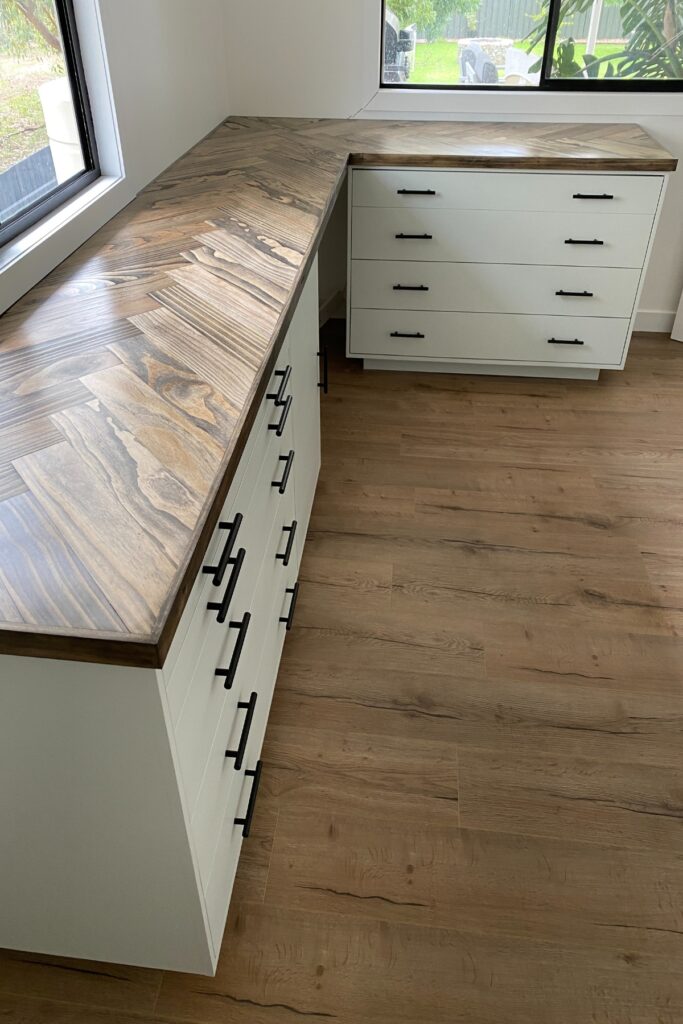 I made this desk – including the drawers which were a big challenge!
I made this desk – including the drawers which were a big challenge! I learnt how to make these serving trays and now give them as gifts!
I learnt how to make these serving trays and now give them as gifts!
Reflective Journaling: Spend a few minutes each day writing in a journal. Reflect on what you’ve learned, your progress, and future learning goals. Journaling is such a good practice!
And learning about yourself is probably the most important type of learning you can do!
Incorporating these learning habits not only improves your skillset but also keeps your mind active and engaged, contributing to lifelong mental agility.
Habit 6: Digital Detox
In our increasingly digital world, it’s important to consciously disconnect from digital devices to reduce stress and improve mental well-being.
Strategies for a Daily Digital Detox:
Set ‘No Screen’ Times: Allocate certain times of the day, especially before bed, as screen-free times. Use this time to engage in other activities like reading or spending time with family.
Even better – go for a complete digital detox and see what a difference it makes.
Limit Social Media Use: Set a daily limit for social media use. Apps that track your usage can help you stay mindful of the time spent on these platforms, and the iPhone does this natively.
You can also set time limits for certain apps to remind you to stop using them (so you don’t get stuck in a doom scroll spiral).
Turn Off Notifications: Disable non-essential notifications on your phone and computer. This reduces constant interruptions and helps you focus on the present moment.
You don’t need the constant ding of your phone notifications – I promise!
Engage in Offline Hobbies: Cultivate hobbies that don’t involve screens, like gardening, painting, or playing a musical instrument. This helps in balancing your digital life with real-world experiences.
Implementing a daily digital detox can lead to improved concentration, better sleep patterns, and stronger relationships with others. It’s about creating a healthy balance between the digital world and your real-life experiences.
Habit 7: Quality Sleep Routine
We’ve all heard how important sleep is – and I don’t think there’d be too many people who’d argue that they’d rather sleep less. But did you know that quality sleep can be just as, if not more important, than quantity of sleep?
A good night’s sleep is fundamental to our overall health and well-being. Establishing a quality sleep routine is crucial for mental clarity, emotional regulation, and physical health.
Consistent, restful sleep recharges the body and mind, preparing us for the challenges of the next day.
Tips for Creating a Restful Sleep Routine:
Establish a Regular Sleep Schedule: Try to go to bed and wake up at the same time every day, even on weekends. This consistency reinforces your body’s sleep-wake cycle.
Soon you’ll find yourself waking up before your alarm goes off, and waking up naturally rather than to an alarm is 👌
Create a Bedtime Ritual: Develop calming activities before bed, like reading, taking a warm bath, gentle stretching, journaling, or even using affirmations. These activities signal to your body that it’s time to wind down.
Optimize Your Sleep Environment: Ensure your bedroom is conducive to sleeping. This means a comfortable mattress and pillows, cool temperature, and minimal light and noise.
Limit Exposure to Screens: Avoid screens (phones, tablets, computers, TV) at least an hour before bed. The blue light emitted by screens can interfere with your ability to fall asleep.
You can even switch your lights over to warm lights, red lights, or even use candles instead of artificial light (just be sure to blow them out before going to sleep).
Be Mindful of Eating and Drinking: Avoid large meals, caffeine, and alcohol close to bedtime as they can disrupt sleep.
Relaxation Techniques: Practice relaxation methods such as deep breathing, meditation, or progressive muscle relaxation to ease the transition into sleep.
I use the Calm app to help with this, guided meditations are much easier for me than attempting to meditate on my own.
By prioritizing your sleep and establishing a routine, you’re not just improving your nights — you’re also setting the tone for more productive, energized, and enjoyable days. Remember, sleep is not a luxury, but a fundamental component of a healthy lifestyle.
You can track your quality of sleep with different apps and trackers too. I use the AutoSleep app on my Apple watch and absolutely love it.
I’ve been able to see that even on the nights when I don’t get enough sleep (as you can see from last night) I still have a good amount of deep sleep, which is the restorative sleep we are aiming for.
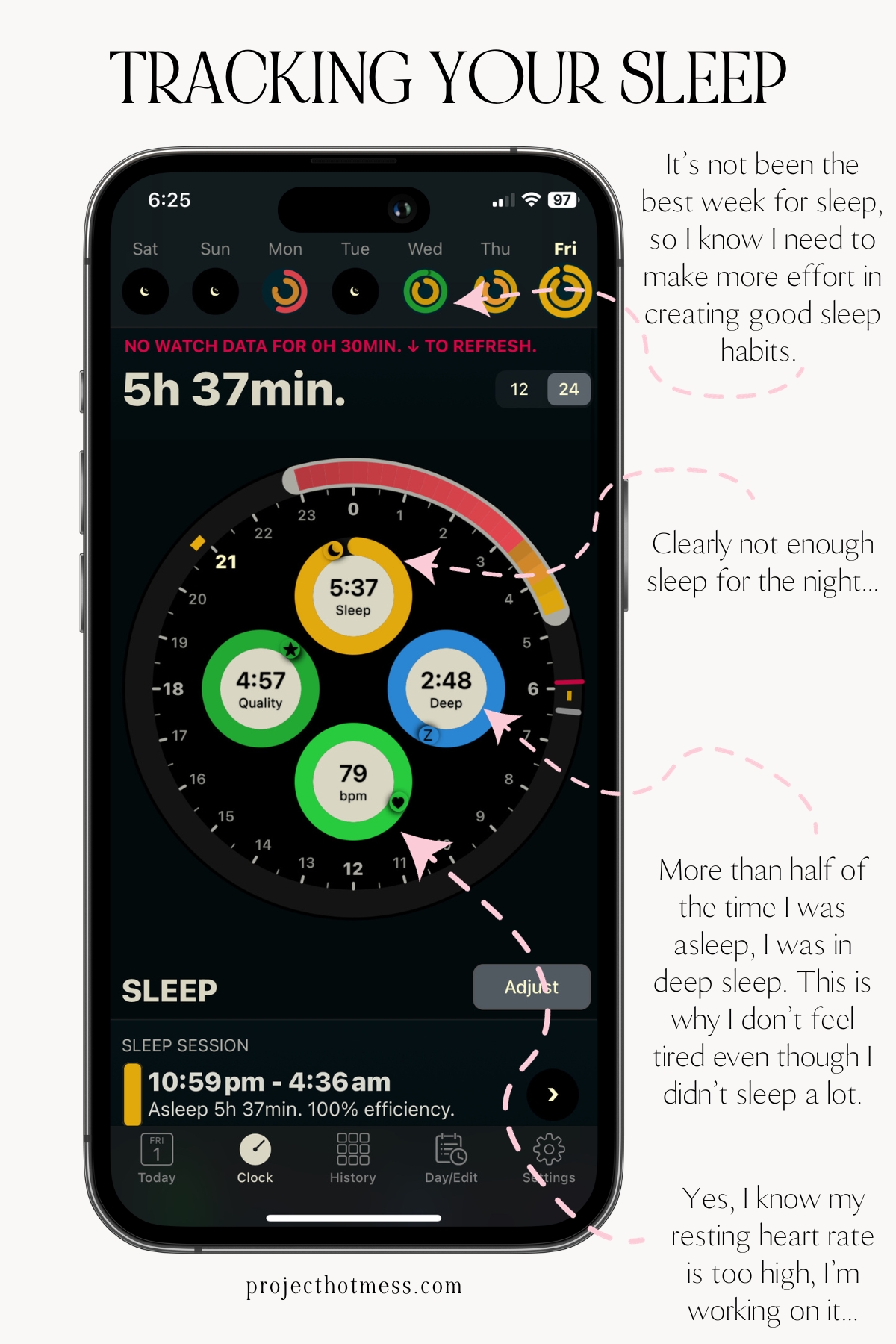
Final Thoughts
To make these habits stick, consider tracking your progress. You can use a journal, an app, or simply a calendar to mark your daily achievements.
Celebrate your successes, no matter how small, and be patient with yourself on the days when things don’t go as planned.
Change takes time, and every step forward is a victory worth acknowledging.
Implementing these habits doesn’t require monumental changes; rather, it’s about making small, consistent adjustments to your daily routine.
Remember, the goal is to create sustainable habits that enrich your life, not to overwhelm yourself with drastic changes.
It’s the little steps, taken consistently, that make the biggest differences in our lives.
